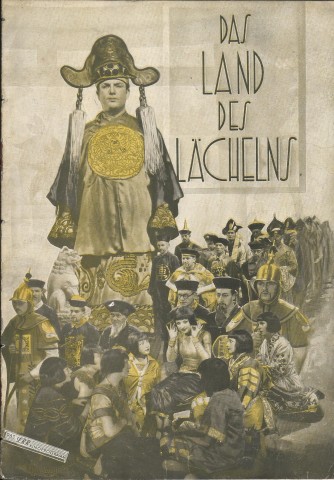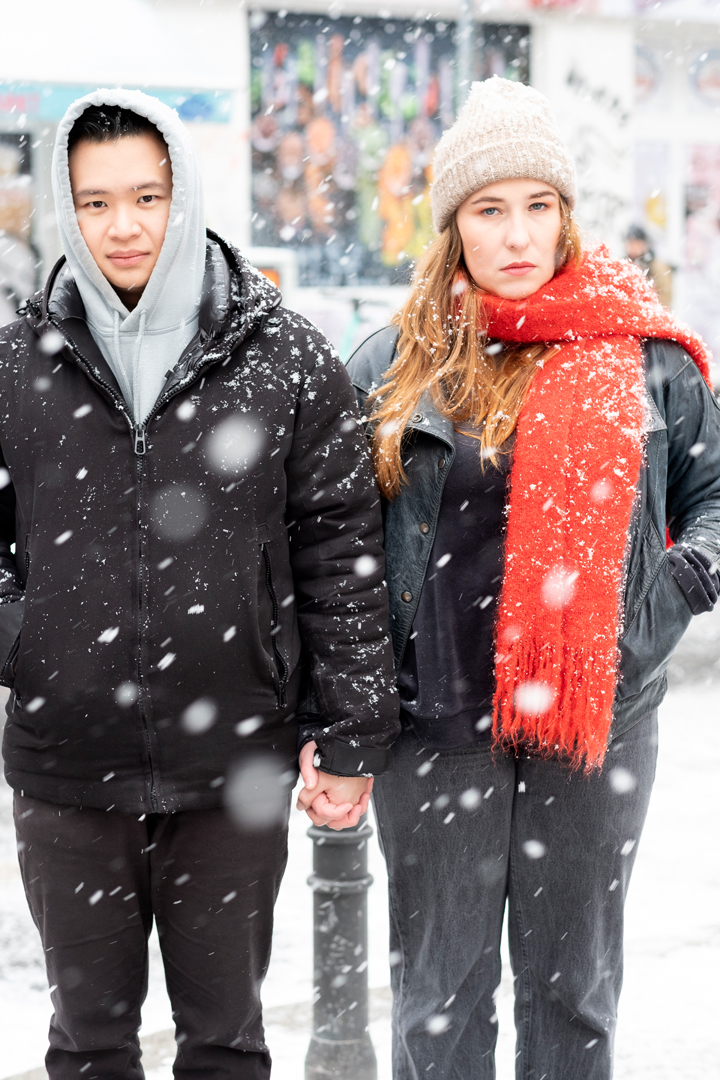Michael J. Hardern
Operetta Research Center
8 January, 2023
Franz Lehár’s 1929 hit Das Land des Lächelns, written for star tenor Richard Tauber and containing the ever popular “Dein ist mein ganzes Herz”, is getting a feminist update at Neuköllner Oper in Berlin. The young authors Elisabeth Pape and Abigél Varga have re-written the blockbuster that is now copyright free. The title of their now show is Lisas Land des Lächelns, i.e. “Lisa’s Land of Smiles”.

The protagonists in “Lisas Land des Lächelns” at Neuköllner Oper. (Photo: Thomas Koy)
The Berlin company labels the new production a “dating operetta” and asks: “How much kitsch can we stomach today before things turn ridiculous?” And: “Can we still say and sing ‘You are my heart’s delight’ if we are serious about love?”
The official press lease states: “Lisa decides to simply try out what might happen. She wants to know what that thing called love is all about, how big romantic dreams can be, and how operetta today might sound. Sure, some will say Lisa is a bit ‘special’ when it comes to these questions. But who cares … we live in Berlin, after all, the world metropolis of diverse life styles.”

Richard Tauber seen in Chinese costume as Prince Sou-Chong in the film version of “Land des Lächelns.”
According to the advance announcement, Lisa prefers Lehár to techno music (can you blame her?), and she loves the “pulling power” of the so-called exotic. In her dating app of choice, she finds what she is looking for: a man called “Sou Chong” who in actually has a totally different offline name and is nothing like his profile suggests at first glance. He was born in China, studies in Berlin, and he can sing exceptionally well.
“It sounds like the beginning of a crazy love story. But: confronted with reality and without the safety net of operetta conventions things turn more complicated than expected,” states the press release. And asks: “Do the questionable and critique-worthy clichés of the exotic in operetta live on, until today, in dating apps and productions of shows like Land ds Lächelns?”
The Neuköllner Oper invited composer Abigél Varga and author Elisabeth Pape to re-examine Lehár‘s „world famous operetta“ and adapt the plot and score for the “current tastes of a polyglot Berlin audience”.
The story is reduced to a quartet of lovers searching for “an idea of themselves,” and the music uses Lehár’s tunes and combines them with Varga’s own music. The whole things is rearranged for instruments that include the Chines plucked zither zheng, aka guzheng.

The protagonists in “Lisas Land des Lächelns” at Neuköllner Oper. (Photo: Thomas Koy)
The soloists are Marie Sofie Jacob as Lisa, Nicholas Malakul as Sou Chong, Luca Schaub as Gustl, and Vivian Yau as Mi, the idea for the project comes from the artistic director of Neuköllner Oper, Bernhard Glocksin, who loves deconstructing and “smashing” famous works at his company (for other examples, click here). Lucky for him, the protection of Lehár’s works ended in 2019. He’s free for all to do whatever they like with him these days. It’s an invitation hard to resist for … let’s say innovative musical theater companies.
The staging is by Ansgar Stephan Weigner, costumes and sets are by Christian Müller. (So much for a true feminist angle.)
Lisas Land des Lächelns – with German and English subtitles for your smartphone – premieres on 27 January and runs through to March 2024.
After the premiere, there’s a podium discussion with the two operetta historians Kevin Clarke and Daniel Molnár, both probably familiar to followers of the Operetta Research Center here. On 24 February there’s another talk after the performance with music ethnologist Yongfei Du plus singers Vivian Yau and Nicholas Malakul about “stereotypes”. The title of the discussion is “Was bist du denn für ein (Stereo-)Typ?”
For more information, click here.
